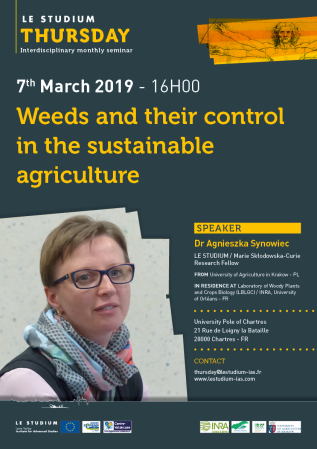Weeds and their control in the sustainable agriculture
University Pole of Chartres
21 Rue de Loigny la Bataille
28000 Chartres
France
Presentation
A farmer has always been struggling with pests, that is crop limiting organisms. They are mainly three groups of organisms: pathogenic fungi, herbivorous insects and weeds. The first two groups of pests appear in cultivation under certain unfavorable conditions. Weeds are always present in the arable field. Ineffective control of weed infestation or its lack may lead to a crop yield decline by up to 90%. Since the 1950s, synthetic chemicals - herbicides dominate the control of weeds; currently it is the basic method of controlling weed infestation. Nowadays, humans face the negative effects of improper use of herbicides - contamination of the environment and food, extinction of many valuable species of weeds, and, on the other hand, the presence of herbicide-resistant weeds.
For the above reasons, in today's sustainable agriculture, the use of chemical and non-chemical methods of controlling weeds is balanced. Weeds are regulated by a number of methods: primarily agronomic, mechanical, biological and only at the end - chemical. This trend is part of my research, related to the search for natural compounds to regulate weed infestation, and being an alternative to synthetic herbicides. Such substances are, among others, essential oils, i.e. volatile compounds of plant origin. Studies from recent years indicate that essential oils cause damage to weeds, limiting their growth and development. The purpose of my speech will be to present my own results against other reports in this area from recent years.
Speaker
LE STUDIUM / Marie Skłodowska-Curie Research Fellow
FROM: University of Agriculture in Krakow - PL
IN RESIDENCE AT: Laboratory of Woody Plants and Crops Biology (LBLGC) / INRA, University of Orléans - FR









